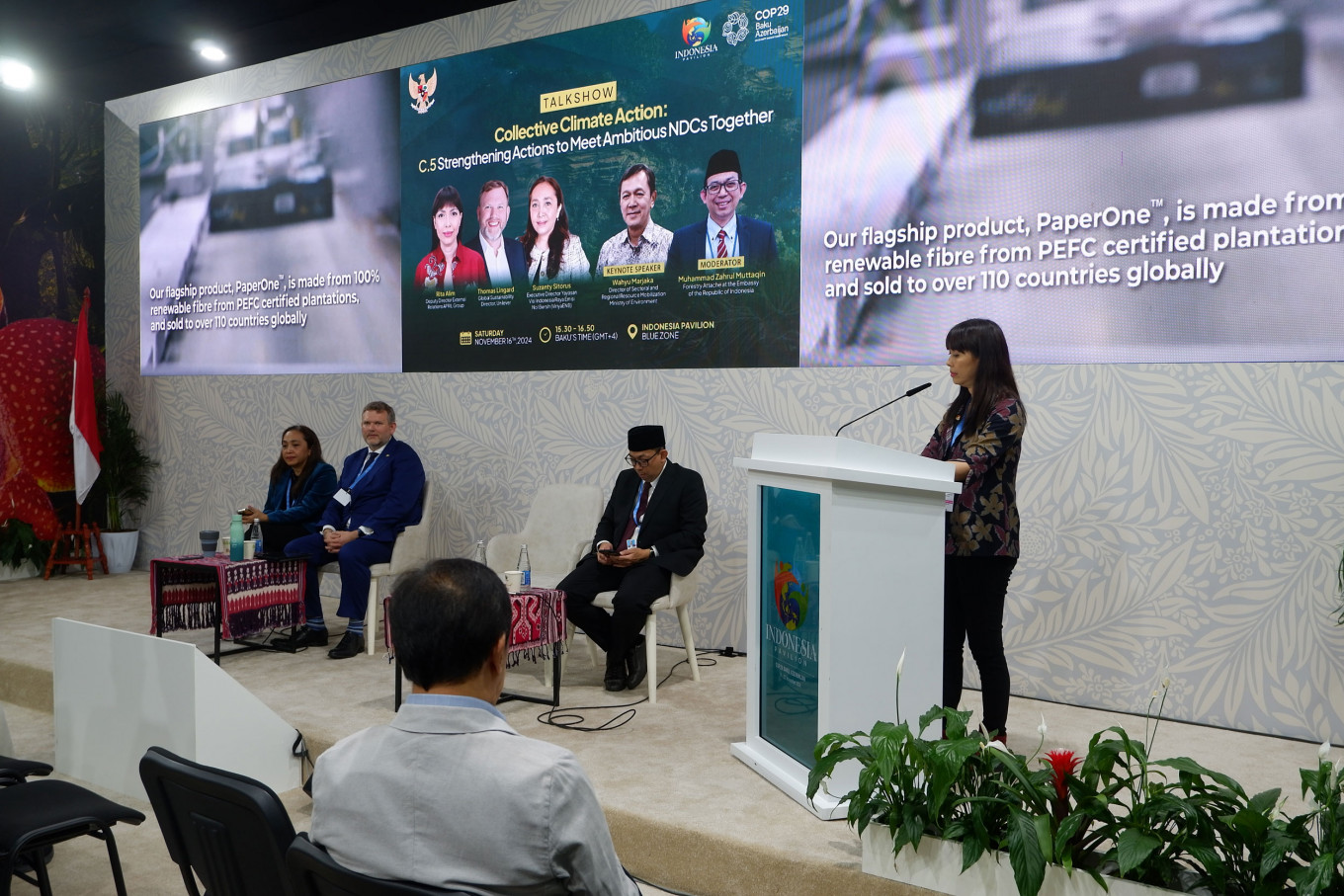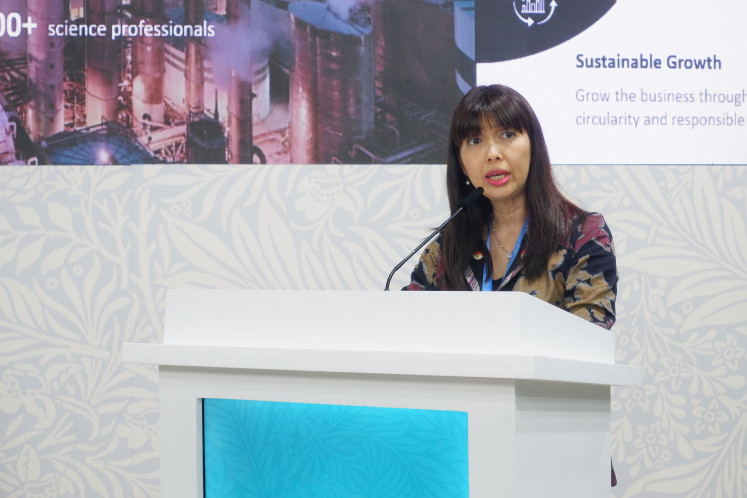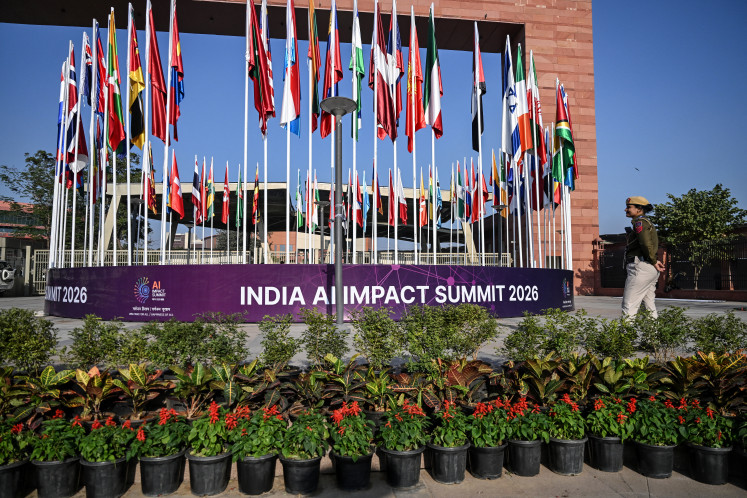Popular Reads
Top Results
Can't find what you're looking for?
View all search resultsPopular Reads
Top Results
Can't find what you're looking for?
View all search resultsSustainable business innovations key to accelerating Indonesia’s NDC targets: APRIL Group
Change text size
Gift Premium Articles
to Anyone
T
he private sector plays a strategic role in accelerating efforts to achieve the targets of Indonesia's Nationally Determined Contribution (NDC), through the implementation of sustainable business principles with a focus on innovation to reduce carbon emissions.
This idea was discussed at the 29th United Nations Climate Change Conference (COP29) in Baku, Azerbaijan, underlining the role of the private sector in accelerating a just transition to a green economy.
Addressing the session titled “Collective Climate Action: Strengthening Actions to Meet Ambitious NDCs Together“ on Nov. 16, Wahyu Marjaka, Director of Sectoral and Regional Mobilization and Resources at the Environment Ministry, said emissions reduction efforts must involve all parties including the private sector, highlighting the need for adaptation and innovation in achieving countries’ NDC targets.
"Companies must adapt and implement sustainable business practices. The private sector’s ability to scale climate solutions globally, leveraging capital supply chains and advancing technology, puts it in a unique position to drive significant change," he said in his keynote speech.
According to Wahyu, Indonesia has set sizable targets to reduce greenhouse gas (GHG) emissions of 31.89 percent independently and up to 43.2 percent with international support.
The country also plans to submit its second NDC to the UN Framework on Climate Change (UNFCCC) by the end of this year, which will include a commitment to limit the global average temperature rise to 1.5 degrees Celsius and achieve net-zero emissions by 2060. This commitment will also include new sectors, including the maritime and upstream oil and gas sectors.
Looking at the global and national climate commitments, Wahyu said governments, the private sector and philanthropic institutions must align their actions, mobilize their resources and create partnerships to achieve these targets.
"When businesses are aligned with the Paris Agreement, they not only foster innovation, but also create demand for clean technology," he emphasized.
The private sector’s role in accelerating decarbonization efforts in Indonesia is also manifested through various innovations implemented by domestic companies. One such example is the initiative presented by APRIL Group, producer of the PaperOne brand of printing paper, in a panel discussion at COP29.
During the session, the pulp and paper producer focused on the waste to value concept, which aims to convert industrial waste into valuable resources and products such as energy, fertilizer and paving materials.
"With government permission, we can utilize sludge as fuel for production. This is our commitment to support sustainable waste management and reduce emissions from landfills," Rita Alim, deputy director of external relations at APRIL Group, told the discussion.
Paper sludge consists of fibers and solid materials produced from wastewater treatment during pulp and paper production. APRIL Group reuses this waste through its recovery boiler technology to generate energy that powers its production activities.
"As of 2023, we have reused more than 323,000 tonnes of nonhazardous and toxic waste, which not only reduces the waste we dispose in landfills but also saves operating costs," Rita explained.
This practice is in line with the company's APRIL 2030 sustainability vision, which aims to achieve its climate positive target by implementing science-based solutions to drastically reduce carbon emissions. The initiative is also in line with APRIL Group's sustainable growth target, which focuses on implementing circular business and responsible production principles.
In line with its commitment, APRIL Group continues to increase the use of so-called new and renewable energy (EBT) including biomass, most of which is obtained from the by-products and waste generated via its production processes.
“By 2030, we aim to source 90 percent of our primary energy needs from EBT. [This year], 88.24 percent of the total energy we consumed was produced and sourced from renewable and cleaner energy sources,” said Rita.
In addition to biomass, APRIL Group fulfills its energy needs through a solar power plant with an installed capacity of 26 megawatts (MW), with plans to increase capaity to 50 MW by 2030.
“We have made these commitments to achieve sustainable business growth and deliver essential progress for the environment, while also supporting government agenda more than ever,” she said.
“We believe what is good for business is good for the community, the country, the climate, customers and the company. Only then will we be sustainable.”
This article was published in collaboration with APRIL Group












